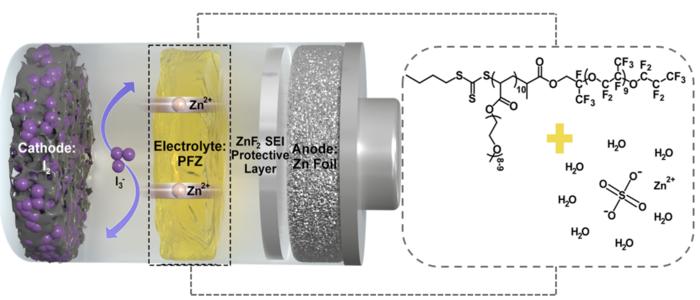From pv magazine ESS News site
The University of Queensland (UQ) research team said symmetric cells employing this electrolyte have demonstrated excellent cycle performance, maintaining stability for approximately 5,000 hours at room temperature, while all-solid-state ZnI2 batteries exhibit more than 7,000 cycles with a capacity retention exceeding 72.2%.
Rechargeable zinc-iodine (ZnI2) batteries have received a lot of attention due to their inherent advantages, including natural abundance, low cost, safety, and high theoretical capacity. However, their limited cycle life remains a major challenge for practical applications.
Namely, the thermodynamic instability of the zinc electrode in an aqueous electrolyte always leads to the release of hydrogen, which causes the battery to swell and eventually fail. In addition to that, ZnI2 batteries are also susceptible to dendrite growth, which can damage the separator and cause battery failure.
Now, researchers at UQ have developed a new class of fluorinated block copolymers as solid electrolytes for all-solid-state ZnI2 batteries with extended lifespan.
Their results demonstrate the formation of a solid electrolyte interphase (SEI) layer on zinc, promoting horizontal zinc growth, mitigating dendrite penetration, and enhancing battery cycle life.
Symmetrical cells employing this electrolyte demonstrate excellent cycle performance, maintaining stability for approximately 5,000 hours at room temperature, while solid-state ZnI2 batteries exhibit more than 7,000 cycles with a capacity retention exceeding 72.2%.
The complete ZnI2 battery has a nearly 100% Coulombic efficiency for more than 7,000 cycles (over 10,000 hours).
Furthermore, the electrolyte exhibits excellent rate performance, delivering a reversible capacity of 79.8 mAh g-1 even at ultra-high current densities of 20 C.
These results highlight the great commercial potential of the new all-solid-state battery design. They offer a promising pathway for the design of fluorosolid-state polymer electrolytes for next-generation ZnI2 batteries with dendrite-free zinc metal anodes and ultra-long battery life.
“This work offers a promising pathway to achieving reliable energy storage in solid-state ZnI2 batteries and introduces innovative concepts for flexible and wearable zinc batteries,” the researchers write.
Their future work will explore more practical application scenarios of this battery design while controlling costs.
Their findings are further discussed in Enhancing Performance and Longevity of Solid-State Zinc-Iodine Batteries with Fluorine-Rich Solid Electrolyte Interphase, published in Materials Features.
This content is protected by copyright and may not be reused. If you want to cooperate with us and would like to reuse some of our content, please contact: editors@pv-magazine.com.









1 comment
By submitting this form you agree to pv magazine using your data for the purposes of publishing your comment.
Your personal data will only be disclosed or otherwise transmitted to third parties for the purposes of spam filtering or if this is necessary for technical maintenance of the website. Any other transfer to third parties will not take place unless this is justified on the basis of applicable data protection regulations or if pv magazine is legally obliged to do so.
You may revoke this consent at any time with effect for the future, in which case your personal data will be deleted immediately. Otherwise, your data will be deleted if pv magazine has processed your request or the purpose of data storage is fulfilled.
Further information on data privacy can be found in our Data Protection Policy.